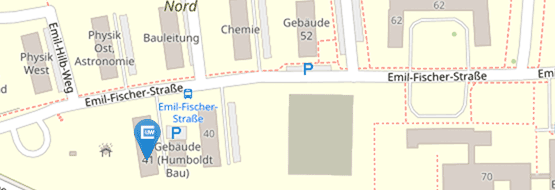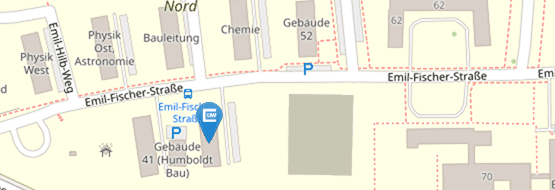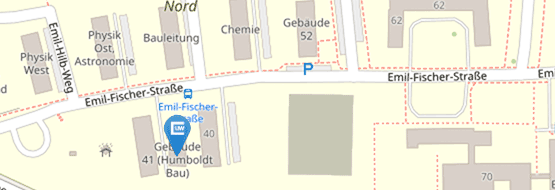Projects
Project Manager: Prof. Dr. Alfio Borzì
Participating scientists: Prof. Dr. Giovanni Manfredi, Prof. Dr. Paul-Antoine Hervieux, Dr. Jan Bartsch
Project period: 05.2025 - 12.2025
Funding institution: Bayerisch-Französisches Hochschulzentrum (BayFrance)
Funding amount: 3.880,00 €
Granting date: 14.05.2025
Funding number: FK-29-2025
Project Description:
The purpose of this project is the formulation and application of a mathematical framework for modeling, simulation and optimal control of Vlasov-Poisson systems where the control is represented as an external magnetic field. Such systems describe the time evolution of a plasma while accounting for the self-consistent electric fields. While great effort has been put into the modeling and numerical solution of such equations, the field of plasma optimal control and design within the kinetic models and applying Monte Carlo methods remains relatively unexplored.
Our main application is the rapid cooling of non-neutral plasmas, a process of great interest to experimental groups. Such plasmas can be confined over long durations in electromagnetic traps, and cooling is typically achieved by adiabatically reducing the trap’s effective stiffness. We aim to derive an optimal control strategy that cools the plasma significantly faster than the adiabatic timescale, by minimizing a functional that measures the deviation from the desired final state.
To this end, we will develop Monte Carlo methods combined with gradient-based optimization techniques to solve the resulting kinetic control problem. The optimal cooling protocols obtained through this approach are expected to outperform standard linear strategies, yielding colder and more stable final states.
This project is innovative both in its mathematical modeling and in its application to real-world plasma physics challenges. It will provide the junior researchers with valuable opportunities to engage with the broader scientific community and strengthen their collaboration and their international research network.
Project Partners:
Prof. Dr. Bernadette Hahn (Verbundkoordinatorin) – Lehrstuhl OIP Inverse Probleme , Universität Stuttgart
Prof. Dr. Alfio Borzì – Lehrstuhl für Wissenschaftliches Rechnen, JMU Würzburg
Prof. Dr. Andreas Maier, Lehrstuhl für Mustererkennung, FAU Erlangen-Nürnberg
Prof. Dr. Herbert Köstler und Priv.-Doz. Dr. Tobias Wech, Experimentelle Radiologie, Universitätsklinikum Würzburg
Prof. Dr. Thorsten Bley, Institut für Diagnostische und Interventionelle Radiologie, Universitätsklinikum Würzburg
Dr. Moritz Berger, Siemens Healthcare GmbH, Erlangen
Prof. Dr. Karsten König und Dr. Andreas Schindele, JenLab GmbH, Berlin
Project period: 04.2020 - 03.2023
Funding institution: Bundesministerium für Bildung und Forschung (Federal Ministry of Education and Research) BMBF
Funding amount: 260.000,00 €
Granting date: 11.2019
Funding number: 05M20WWB
Project Description:
The project examines the use and further development of machine learning methods for MR image reconstruction and for the classification of liver lesions. Based on a comparison model and data-driven image reconstruction methods, these are to be systematically linked in order to enable high acceleration without sacrificing diagnostic value. In addition to the design of suitable networks, research should also be carried out to determine whether metadata (e.g. age of the patient) can be incorporated into the reconstruction. Furthermore, suitable classification algorithms on an image basis are to be developed and the potential of direct classification on the raw data is to be explored. In the long term, intelligent MR diagnostics can significantly increase the efficiency of use of MR hardware, guarantee better patient care and set new impulses in medical technology.
Project Manager: Prof. Dr. Alfio Borzì
Participating scientists: Prof. Dr. Abderrahmane Habbal
Project period: 01.2018 - 12.2018
Funding institution: Bayerisch-Französisches Hochschulzentrum (BFHZ)
Funding amount: 1.845,00 €
Granting date: 23.01.2018
Funding number: FK32-17
Project Description:
The purpose of this project is the formulation and application of a new mathematical framework for modelling avoidance and/or catching in multi-agents motion in the framework of differential Games with stochastic processes and related Fokker-Planck equations. This project has manifold application as the simulation of motion of multiple agents (individuals, robots, intelligent vehicles, etc.) in a given space (e.g. an exposition hall) and its use to improve design of motion areas to, e.g., facilitate evacuation, manoeuvering, delivering, intercept, etc.. In particular, we refer to the ongoing research and development efforts in the automotive industry to construct autonomous (also driver-less) cars that assist in safe navigation and traffic management. This project would like to contribute to these efforts with the modelling of car-to-car avoidance of collision and catching, where the latter situation may occur in the case of pack delivery or intercept by a police car. The leading concept of this project is to model decision-making control for collision avoidance or meeting as a Nash game. In this framework, the dynamics of each agent is modelled by a differential equation and to each agent is associated an objective of its motion; for example reach the desired destination with a minimal effort. The second basic concept of our project is to assume a stochastic dynamics of the agents to take into account random variability and uncertainty in the data. Mathematically, the two concepts mentioned above result in the formulation of Nash games governed by multiple Fokker-Planck (FP) partial differential equations where the control mechanism models the agent (as a player) strategy to solve the game. This project is very innovative for its modelling and application aspects, and also from a fundamental mathematical point of view. In fact, the theoretical and numerical investigation of FP Nash games in combination with different agents objectives and different game strategies is novel and would produce important outcomes for many mathematical fields of research. The successful realization of this project relies on preliminary work done by the French and German partners in the field of the FP Nash games for modelling two-pedestrian motion. This project also aims to extend the results of preliminary work to multiple agents and different classes of Nash games.
Project Partners:
BU Wuppertal (Matthias Ehrhardt), Applied Mathematics and Numerical Analysis, University of Wuppertal, Germany.
CU Bratislava (Daniel Sevcovic), Department of Applied Mathematics and Statistics, Comenius University, Bratislava, Slovakia.
UP Valencia (Lucas Jódar), Instituto de Matemática Multidisciplinar, Universitat Politècnica de València, Valencia, Spain.
U Rousse (Lyuben G. Vulkov), Department of Numerical Analysis and Statistics, Ruse University Angel Kanchev, Ruse, Bulgaria.
ISEG Lisboa (Maria do Rosario Grossinho), Instituto Superior de Economia e Gestão (ISEG), Lisbon, Portugal.
UA Zittau ( Ljudmila Bordag), Fakultät Mathematik/Naturwissenschaften, Hochschule Zittau/Görlitz, Germany.
TU Wien (Ansgar Jüngel), Institute for Analysis and Scientific Computing, TU Wien, Vienna, Austria.
TU Delft (Kees Oosterlee), Delft Institute of Applied Mathematics (DIAM), TU Delft, The Netherlands.
U Greenwich (Choi-Hong Lai), School of Computing and Mathematical Sciences, University of Greenwich, Greenwich, London, UK.
U Würzburg (Alfio Borzi), Lehrstuhl für Mathematik IX (Chair Scientific Computing), University of Würzburg, Germany.
U Antwerp (Karel in 't Hout), Department of Mathematics and Computer Science, University of Antwerp, Belgium.
Local Research Team:
Prof. Dr. Alfio Borzi
Dr. Stephan Schmidt
Beatrice Gaviraghi
Dr. Masoumeh Mohammadi
Dr. Suttida Wongkaew
Project period: 01.2013 - 12.2016
Funding institution: Marie Curie Actions, Initial Training Networks (ITN)
Funding amount: 3,6 Mio. € (Uni Würzburg: 225.000 €)
Granting date: 10.2012
Funding number: 304617
Multi-ITN STRIKE Website: www.itn-strike.eu
Project Description:
The computational complexity of mathematical models employed in financial mathematics has witnessed a tremendous growth that requires the development of advanced numerical techniques appropriate for the most present-day applications in financial industry. Besides a series of internationally recognized researchers from academics, leading quantitative analysts from the financial industry also participate in this network. The challenge lies in the necessity of combining transferable techniques and skills such as mathematical analysis, sophisticated numerical methods and stochastic simulation methods with deep qualitative and quantitative understanding of mathematical models arising from financial markets. The main training objective is to prepare, at the highest possible level, young researchers with a broad scope of scientific knowledge, in particular computational finance, and to teach transferable skills, like social awareness which is very important in view of the recent financial crises. In this research training network our aim is to deeper understand complex nonlinear financial models and to develop effective and robust numerical schemes for solving problems arising from the mathematical theory of pricing financial derivatives and related financial products. This aim will be accomplished by means of financial modelling, mathematical analysis and numerical simulations, optimal control techniques and validation of models. Within the ITN Strike Network, the Chair of Scientific Computing in Würzburg is responsible for the investigation of new robust and efficient optimal control techniques for financial market models.
Project Partners:
Universität Trier (Volker Schulz), FB IV, Mathematik, University of Trier, Germany.
Hochschule Geisenheim i.G. (Kai Velten), Modellierung und Systemanalyse am Zentrum für Weinforschung und Verfahrenstechnologie der Getränke, University of Geisenheim, Germany.
JMU Würzburg (Alfio Borzi), Lehrstuhl für Mathematik IX (Chair Scientific Computing), University of Würzburg, Germany.
Project period: 07.2013 - 06.2017
Funding institution: Bundesministerium für Bildung und Forschung
Funding amount: 315.000,00 €
Granting date: 06.2013
Funding number: 05M13WWA
Project Description:
Fermentation plays an outstanding role as a basic biochemical process in many technological processes. In this project, fermentation processes in the production of biogas and wine are to be modelled and simulated in spatial and temporal detail. Through the combined investigation of biogas and wine production, it is possible to exploit synergy effects, as the more easily controllable wine fermentation can be regarded as a prototype for the more complex biogas fermentation. The models will be developed based on a common generic basic model with the aim to optimise the processes especially with regard to thermal energy consumption, taking into account product specific aspects such as gas yield (biogas) or aroma profile (wine). This project is therefore part of the climate/energy demand area of the German government's high-tech strategy.
Project Partners:
Priv.-Doz. Dr. med. Christoph Isbert, Stellvertretender Klinikdirektor der Klinik & Poliklinik für Allgemein- und Viszeralchirurgie, Gefäß- und Kinderchirurgie, Universitätsklinikum Würzburg
Prof. Dr. Herbert Köstler, Institut für Röntgendiagnostik, Universität Würzburg
Prof. Dr. Alfio Borzì, Lehrstuhl für Wissenschaftliches Rechnen, Universität Würzburg
Project period: 01.2013 - 12.2015
Funding institution: IZKF (Interdisziplinäres Zentrum für Klinische Forschung) der Universität Würzburg
Funding amount: 358.000 € gesamt (Anteil Borzì: 132.000 €)
Granting date: 10.2012
Funding number: F-254
Project Description:
The aim of this project is to develop a dynamic 3D MR with high temporal and spatial resolution, to evaluate the impact of intussusception in an ex vivo model for the clinical outlet obstruction, and to validate these data by patient data. In this project techniques for the acquisition and reconstruction of 3D MR images will be developed. To this end, accelerated MR sequences will be developed by using parallel imaging and methods including prior knowledge (compressed sensing) as well as reconstruction techniques for these dynamic 3D MR images using multigrid schemes for clinical acceptable reconstruction times. This research work will be carried out promoting a joint interdisciplinary collaboration between the Institut für Mathematik, the Institut für Röntgendiagnostik, and the Klinik für Allgemein-, Viszeral-, Gefäß- und Kinderchirurgie, Universitätsklinikum Würzburg.
Project Leader: Alfio Borzi, Lehrstuhl für Mathematik IX (Chair Scientific Computing), University of Würzburg, Germany.
Participating scientists: Prof. Dr. Uwe Helmke
Project period: 10.2011 - 10.2014
Funding institution: DFG
Funding amount: 185.000,00 €
Granting date: 25.10.2011
Funding number: Bo3580/2-1
Project Description:
The goal to achieve full control on complex, high-dimensional quantum systems in an optimal manner poses new challenges for system and control theory. The issue is of paramount importance for the development of future key technologies, such as quantum computing, quantum communication and the manipulation of nanosystems. New challenges arise if the interaction structure is fully taken into account to enable new control strategies. This research project aims at achieving a fundamental understanding of controllability properties and optimal control strategies for finite-dimensional interacting quantum dynamical systems, where structural properties arising from the global tensor product structure of the state spaces will play a crucial role. Our methods will combine techniques from nonlinear control, Lie group theory, and optimal control on function space





